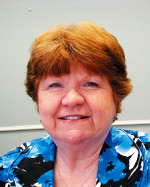
Cook
By Catherine Cook
Ten weeks – the window of time from the closing of the previous school year to the opening of the next. “Summer break” – as it is often called – is anything but a “break” at schools. The familiar scent of newly cleaned and waxed floors is a palpable reminder of the work that continues throughout the summer to be refreshed and renewed for the upcoming school year. While the school buildings are being refurbished, the educators have used the summer break for refreshing, too.
Many have taken coursework or participated in workshops – and yes, they’ve taken another important refresher – a vacation (often at the beach) – all to be ready for that all important ‘first day of school.’ Classrooms that were packed away for proper cleaning are being unpacked, reorganized, and decorated – a summer ritual for teachers.
Teaching materials and textbooks are being counted and distributed and student supplies are being purchased. The first day of school for 2014-2015 is nearing, and the staff at each of our Catholic schools across the diocese is preparing to welcome returning and new students.
Another important ritual is planning for a year of instruction. It’s not enough to be ready for the first day of school. Educators must take the long view and think about what will be taught across the year until the last day of the school year.
The planning for the instructional year brings to mind the hot topic that continues to spark controversy – Common Core State Standards (CCSS). There continue to be misunderstandings about the role the CCSS play in Catholic schools across the country and in our diocese. We, Catholic school educators in the Diocese of Jackson, continue to answer questions about the use of CCSS. Most concerns focus on either a fear that any use of the standards ties our schools to federal curriculum requirements and/or that we are bound by the CCSS assessments and reading lists. Our Catholic schools are free to design our curriculum, plan and implement instruction, and assess learning in any way we determine appropriate for our students.
Our schools are accredited by the State Board of Education, and are therefore required to meet the Non-public School Accreditation Standards. Although established by the State Board of Education, these are not the same accreditation standards as our public counterparts. The Non-public School Accreditation Standards were revised in 2004 by a committee of non-public school educators that included representatives from both Catholic dioceses in Mississippi – Biloxi and Jackson.
The first and most important requirement that these standards place on our schools as relates to curriculum and instruction is that our “school curriculum is in conformity with the mission statement and is in keeping with the needs, aptitudes, and potential of the students enrolled” (NP Standard #19).
We are required to include reading/language arts, mathematics, social studies, science, physical education, and the arts in our kindergarten – grade eight curriculum. High schools must include the secondary course requirements that include the same as those for K-8 with the addition of business and technology. Our Catholic high school graduation requirements have and continue to exceed the state department of education requirements as well as those established by the institutions of higher learning.
Back to the issue of the common core – the Diocese of Jackson has for at least 20 years used state curriculum frameworks and standards as outlined by each of the subject area organizations (National Council of Teachers of English, National Council of Teachers of Mathematics, National Science Teachers Association, etc.), our National Catholic Catechetical Directory and the Catechism of the Catholic Church, as well as the standards included in the national assessments (ACT and Stanford Achievement Tests) as guides for developing a Catholic school curriculum. This has not changed with the introduction of the CCSS. It has been used along with the other national academic and Catholic catechetical documents listed above as we continue define student outcomes – what students should know and be able to do — for each grade level. Only Catholic schools use this formula which includes Catholic teachings for developing curriculum. For this reason our core is not common with public schools nor non-Catholic private schools.
There is no state or federal mandate for our schools to use any particular textbook or materials for teaching – only that texts have a copyright year within 12 years of the current year. This includes suggested reading titles. However, your child may very well bring home a textbook with “Common Core” emblazoned on the front cover. Many publishers across the country are making this claim about new textbooks. This is not unlike any other time in publishing history when minor changes are made to a textbook so a publisher can print a newer version. Teachers will tell you that often changes are minimal. And, even when changes are significant, remember that textbooks are a tool that do not and have not been used solely or totally as presented.
We take care to hire educators with the highest qualifications and skills to teach in our schools, and we are using their expertise and experience to review and revise standards for student learning, instructional methods and assessment measures.
This is an ongoing process for educators to ensure that students are receiving the academic program that not only includes essential content, skills, critical thinking, and problem solving, but one that is imbued with Gospel values. This is the hallmark of Catholic education – this is why our core is not common. We continue to take pride in the work of our educators and administrators across the diocese.
Our students continue to excel in academics, athletics, the fine arts, and service to others. Thank you to the parents and patrons that make Catholic education – communities of faith, knowledge, and service – a reality for the children of Mississippi.
(Catherine Cook is the Superintendent of Catholic Schools for the Diocese of Jackson)
